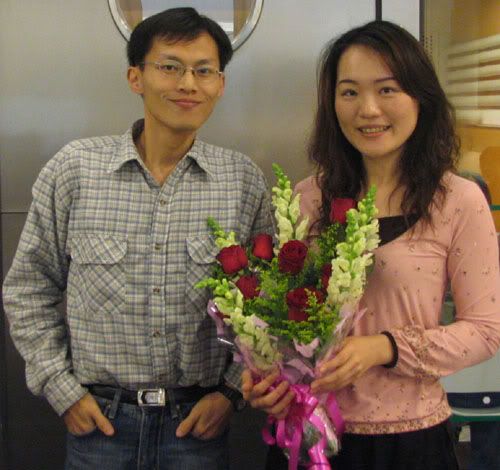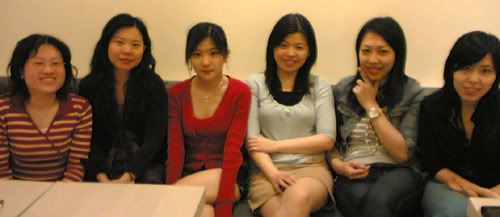20060401, Article, Picture, Feedback
Happy English Club 電子報 本報由EVP Team編審
網站 http://www.happyforum.org/ 歡迎超連結並轉寄網址
論壇 http://www.happyforum.org/happy/ 歡迎至論壇討論
Time:第 49 次例會,2006年4月1日(週六)下午3~5點
Place: viewtopic.php?t=15
15:00~15:30 gossiping and chatting
15:30~16:00 warm up-role play
16:10~17:00 topic discussion
Host: Iris Chen
Assistant host: Mindy Su
Topic:What interviewers look for
Sources:
http://www.careers.manchester.ac.uk/get ... s/lookfor/
The interviewer is likely to be making an assessment against an internalized or written checklist of qualities. Most employers explore the following areas in the course of the initial interview.
Communication skills
A good interviewer is likely to ask you a number of open-ended questions to which the style of the reply will be as important as the content. A good answer will be clearly expressed and will cover the question yet be concise. Be prepared to give an example of a presentation which you have made in an academic or other context.
Personal achievements
You are likely to be given the opportunity to say something about your non-academic activities and your work experiences. The interviewer will be particularly interested to hear of initiative, responsibility, personal skills, and teamwork and achieved objectives.
Intellectual abilities
You may be asked direct questions to gain more detailed information about your past and expected academic results. More demandingly, you may be asked a general question, based loosely on your academic discipline, to test your ability to draw a specific conclusion from a mass of information. Alternatively, you may be asked some hypothetical questions related to the job for which you have applied to reveal both your attitude to a work situation and your ability to think on your feet.
Commitment
There will be times when you will be working under pressure and will be expected to show a high level of commitment. The employer may seek signs of this in a number of ways. They will be pleased to learn the positive reasons that you have for wishing to take up a specific role in their organisation. You may be asked to show evidence of a determination to succeed and to have some idea of your longer-term goals.
Time management
Many graduates find that their job requires several tasks to be carried out at the same time. To meet deadlines and to be successful in such an environment it is necessary to take an overview and to plan your time effectively. Interviewers may look for evidence that you have made good use of your time and opportunities so far.
Career motivation
The interviewer may ask questions to find out more about your career choice and your motivation for the type of work.
Knowledge about the company
The interviewer will be looking to assess your knowledge of the company. They will be looking for evidence to show that you are committed to the organization and understand the nature of the work. They may be looking for evidence about your knowledge of the sector they work in and their competitors.
Technical/specialist knowledge
The interviewer may be looking to test your technical knowledge about the area of work or subject studied at university. They will be looking for evidence of an understanding of the main principles of the subject. Technical and specialist knowledge questions can be used at interviews for many work areas. They are often used in engineering disciplines, information technology and economics but not exclusively.
Vocabulary:
candidate n 求職應徵者[(+for)]
interviewer n 接見者;採訪者
job vacancy n 空缺;空職;空額[C][(+for)]
CV n curriculum vitae [拉丁文] 履歷表
cover letter n 附件於履歷第一頁座簡要的說明
reference n 推薦;證明人,推薦人;推薦函
job seminar n 工作說明會
HR human resources 人力資源
supervisor n 上級,第一線監督者
savvy n 理解能力;悟性
witty adj. 措辭巧妙的;詼諧
detail-oriented adj. 細節導向
good logicality adj. 邏輯性佳
commitment n 託付,委任
courteous adj. 謙恭的,有禮貌的
Let’s talk about…
1. What are the most impressed interview/ interviewer that you have ever had/ met?
2. What do you usually do before an interview?
3. Please try to think what’s the principle would be your top priority while evaluating candidates if you were the interviewer?
4. Imagine there is an interview. You meet many competitive candidates that may more be qualified than you. How would you do to strengthen the impression on interviewers and get the job further?
Reference:
Top ten tips for interview:
http://www.careers.manchester.ac.uk/get ... iews/tips/




 例會須知
例會須知 

參與例會,請自行列印當週的討論文章並帶至現場,圖示如下:


 請將社團網站,加入我的最愛
請將社團網站,加入我的最愛 

http://www.happyforum.org/
台北,每週六 (2005年6月起)
Taipei, Saturday, Weekly
from June, 2005
Place:
viewtopic.php?t=15

高雄,每月最後一個週日 (2007年4月起)
Kaohsiung, Final Sunday, Monthly
from April, 2007
Place:
viewtopic.php?t=15

網站 http://www.happyforum.org/ 歡迎超連結並轉寄網址
論壇 http://www.happyforum.org/happy/ 歡迎至論壇討論
Time:第 49 次例會,2006年4月1日(週六)下午3~5點
Place: viewtopic.php?t=15
15:00~15:30 gossiping and chatting
15:30~16:00 warm up-role play
16:10~17:00 topic discussion
Host: Iris Chen
Assistant host: Mindy Su
Topic:What interviewers look for
Sources:
http://www.careers.manchester.ac.uk/get ... s/lookfor/
The interviewer is likely to be making an assessment against an internalized or written checklist of qualities. Most employers explore the following areas in the course of the initial interview.
Communication skills
A good interviewer is likely to ask you a number of open-ended questions to which the style of the reply will be as important as the content. A good answer will be clearly expressed and will cover the question yet be concise. Be prepared to give an example of a presentation which you have made in an academic or other context.
Personal achievements
You are likely to be given the opportunity to say something about your non-academic activities and your work experiences. The interviewer will be particularly interested to hear of initiative, responsibility, personal skills, and teamwork and achieved objectives.
Intellectual abilities
You may be asked direct questions to gain more detailed information about your past and expected academic results. More demandingly, you may be asked a general question, based loosely on your academic discipline, to test your ability to draw a specific conclusion from a mass of information. Alternatively, you may be asked some hypothetical questions related to the job for which you have applied to reveal both your attitude to a work situation and your ability to think on your feet.
Commitment
There will be times when you will be working under pressure and will be expected to show a high level of commitment. The employer may seek signs of this in a number of ways. They will be pleased to learn the positive reasons that you have for wishing to take up a specific role in their organisation. You may be asked to show evidence of a determination to succeed and to have some idea of your longer-term goals.
Time management
Many graduates find that their job requires several tasks to be carried out at the same time. To meet deadlines and to be successful in such an environment it is necessary to take an overview and to plan your time effectively. Interviewers may look for evidence that you have made good use of your time and opportunities so far.
Career motivation
The interviewer may ask questions to find out more about your career choice and your motivation for the type of work.
Knowledge about the company
The interviewer will be looking to assess your knowledge of the company. They will be looking for evidence to show that you are committed to the organization and understand the nature of the work. They may be looking for evidence about your knowledge of the sector they work in and their competitors.
Technical/specialist knowledge
The interviewer may be looking to test your technical knowledge about the area of work or subject studied at university. They will be looking for evidence of an understanding of the main principles of the subject. Technical and specialist knowledge questions can be used at interviews for many work areas. They are often used in engineering disciplines, information technology and economics but not exclusively.
Vocabulary:
candidate n 求職應徵者[(+for)]
interviewer n 接見者;採訪者
job vacancy n 空缺;空職;空額[C][(+for)]
CV n curriculum vitae [拉丁文] 履歷表
cover letter n 附件於履歷第一頁座簡要的說明
reference n 推薦;證明人,推薦人;推薦函
job seminar n 工作說明會
HR human resources 人力資源
supervisor n 上級,第一線監督者
savvy n 理解能力;悟性
witty adj. 措辭巧妙的;詼諧
detail-oriented adj. 細節導向
good logicality adj. 邏輯性佳
commitment n 託付,委任
courteous adj. 謙恭的,有禮貌的
Let’s talk about…
1. What are the most impressed interview/ interviewer that you have ever had/ met?
2. What do you usually do before an interview?
3. Please try to think what’s the principle would be your top priority while evaluating candidates if you were the interviewer?
4. Imagine there is an interview. You meet many competitive candidates that may more be qualified than you. How would you do to strengthen the impression on interviewers and get the job further?
Reference:
Top ten tips for interview:
http://www.careers.manchester.ac.uk/get ... iews/tips/



參與例會,請自行列印當週的討論文章並帶至現場,圖示如下:

http://www.happyforum.org/
台北,每週六 (2005年6月起)
Taipei, Saturday, Weekly
from June, 2005
Place:
viewtopic.php?t=15

高雄,每月最後一個週日 (2007年4月起)
Kaohsiung, Final Sunday, Monthly
from April, 2007
Place:
viewtopic.php?t=15
